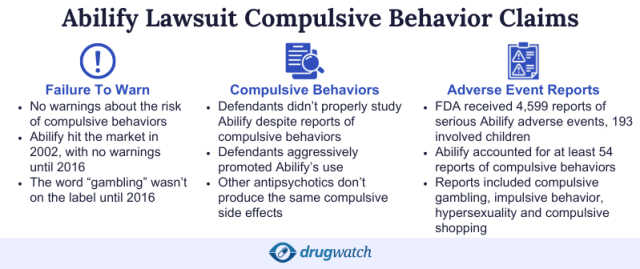Abilify Lawsuits
Abilify lawsuits claimed the drug’s manufacturers failed to warn doctors and consumers that their antipsychotic medication could cause compulsive gambling, eating, sex and shopping. The defendants reached a confidential settlement in 2019 to settle all federal cases in Florida and state cases in California and New Jersey. Attorneys are no longer accepting Abilify lawsuit cases.
Our content is developed and backed by respected legal, medical and scientific experts. More than 30 contributors, including product liability attorneys and board-certified physicians, have reviewed our website to ensure it’s medically sound and legally accurate.
legal help when you need it most.
Drugwatch has provided people injured by harmful drugs and devices with reliable answers and experienced legal help since 2009. Brought to you by The Wilson Firm LLP, we've pursued justice for more than 20,000 families and secured $324 million in settlements and verdicts against negligent manufacturers.
More than 30 contributors, including mass tort attorneys and board-certified doctors, have reviewed our website and added their unique perspectives to ensure you get the most updated and highest quality information.
Drugwatch.com is AACI-certified as a trusted medical content website and is produced by lawyers, a patient advocate and award-winning journalists whose affiliations include the American Bar Association and the American Medical Writers Association.
About Drugwatch.com
- 15+ Years of Advocacy
- $324 Million Recovered for Clients
- 20,000 Families Helped
- A+ BBB Rating
- 4.9 Stars from Google Reviews
Testimonials
I found Drugwatch to be very helpful with finding the right lawyers. We had the opportunity to share our story as well, so that more people can be aware of NEC. We are forever grateful for them.
- Legally reviewed by Ann Brown, Esquire
- Last update: March 26, 2025
- Est. Read Time: 3 min read
Status of Abilify Lawsuits
As of July 2024, this litigation has no new developments, and our legal partners are not accepting cases.
In February 2019, Bristol-Myers Squibb and Otsuka America Pharmaceutical settled with thousands of people who had sued the companies over compulsive behavior they blamed on Abilify. The terms of the settlement were confidential.
The settlement covered people participating in multidistrict litigation, or MDL, in federal court in north Florida and litigations in state courts in New Jersey and California. The settlement also applied to any other cases in state and federal courts.
Abilify Lawsuit Timeline
-
February 2019
The judge released an order establishing the settlement fund for all Abilify claims in the MDL and state courts. To take effect, 90% of plaintiffs had to opt into the settlement, which was kept confidential.
-
December 2018
The judge issued an order establishing the discovery schedule for fast-tracked cases.
-
August 2018
Seventeen plaintiffs filed lawsuits in the Philadelphia Court of Common Pleas. Lawsuits claimed Abilify caused compulsive gambling, shopping, sex and binge eating. In the MDL, the judge issued an order identifying 40 cases eligible for bellwether, or test, trials.
-
May 2018
The New Jersey Supreme Court agreed to consolidate 42 Abilify lawsuits into multicounty litigation.
-
2017
Hundreds of Canadians filed an Abilify class-action lawsuit. Among the plaintiffs was Christina Milisic, who said she lost upward of $400,000 from the compulsive gambling habit she developed while taking the drug.
Why Did People File Lawsuits?
Hundreds of people filed lawsuits saying Abilify caused them to compulsively gamble, spend money or eat. Other Abilify side effects mentioned in the lawsuits include suicide attempts and thoughts and compulsively viewing pornography and playing video games.
Compulsive behavior warnings were added to U.S. labels in August 2016, following the FDA’s May 2016 announcement that the warnings should be added. Shortly after, people began filing lawsuits. Lawsuits claimed that the makers of Abilify didn’t warn the public about the risk of compulsive behaviors before the FDA’s warning.
“The U.S. Food and Drug Administration (FDA) is warning that compulsive or uncontrollable urges to gamble, binge eat, shop, and have sex have been reported with the use of the antipsychotic drug aripiprazole (Abilify, Abilify Maintena, Aristada, and generics).”
Lawsuits said Abilify labels in Europe and Canada warned about the risk of “pathological gambling,” while these warnings were not included on labels in the U.S. before January 2016. At that time, pathological gambling was included in the “postmarketing experience” portion of the U.S. labels but not in the warning portion.

Compulsive gamblers filed lawsuits seeking reimbursement for their losses. Compulsive eaters sued for money to cover medical costs, including weight-loss surgery. People who engaged in hypersexual activity sought compensation for their financial and emotional costs from divorce, for example.
Examples of Abilify Lawsuits
Within seven months of the FDA’s Abilify safety communication, people filed more than 40 Abilify lawsuits. By the time of the February 2019 settlement agreement, more than 2,500 lawsuits had been filed in the MDL alone.
Ability Lawsuit Examples
In April 2016, Joseph Edgar filed suit, alleging that he began to compulsively gamble after he started taking Abilify in April 2009. The gambling problems stopped after he stopped taking the drug in April 2014, but he had lost more than $36,000 and faced other mental and physical damages.
A day after Edgar filed suit in Pennsylvania, a woman named Athalean Harper-Mosley filed a similar suit in California. She claimed she began taking Abilify in July 2007, incurred gambling losses of more than $65,000 and stopped having impulsivity problems after she stopped taking the drug in May 2014.
Patrick Parks sued the drug’s makers in November 2016. Parks began taking the drug around May 2013 and “began compulsively gambling shortly thereafter,” according to his complaint. He stopped taking Abilify in August 2014 and stopped gambling. But by then, he had already lost more than $75,000.
Similarly, Massachusetts resident Rikki Carlson sued Bristol-Meyers Squibb, Otsuka Pharmaceutical and Otsuka American Pharmaceutical, alleging that after she began taking Abilify in December 2010, she began compulsively gambling, eating and shopping. Those behaviors stopped after she stopped taking the medication in March 2016.
Other Litigation
In addition to litigation for compulsive behaviors, people have sued Bristol-Myers Squibb claiming Abilify causes tardive dyskinesia and Type 2 diabetes.
Donald W. Proffitt Jr. claimed he developed tardive dyskinesia because of taking Abilify in a lawsuit he filed in July 2018. Senior U.S. District Judge David A. Faber noted in his opinion that Abilify labels carried detailed warnings about tardive dyskinesia.
Five women sued Bristol-Myers Squibb Co. and Otsuka American Pharmaceutical in 2014 and 2015, alleging Abilify caused Type 2 diabetes in children. Those suits were dismissed. They were all filed in New York, and the defendants successfully argued that they would be unable to get out-of-state witnesses to testify.
Federal, State Settlements
In litigation unrelated to personal injury claims, Bristol-Myers Squibb paid out settlements to resolve marketing and kickback allegations brought by the U.S. Department of Justice and several states.
In 2007, Bristol-Myers Squibb paid more than $515 million to settle allegations brought by the U.S. Department of Justice accusing Bristol-Myers Squibb of promoting Abilify for pediatric use and to treat dementia-related psychosis. Neither of these uses was FDA-approved.
Bristol-Myers Squibb directed its “sales force to call on child psychiatrists and other pediatric specialists, and the sales force then urged physicians and other providers to prescribe Abilify for pediatric patients,” the Department of Justice said in a statement.
The company also created a specialized long-term care sales team that “called almost exclusively on nursing homes, where dementia-related psychosis is far more prevalent than schizophrenia or bipolar disorder.”
States, D.C. Reach $19.5M Deal
In December 2016, Bristol-Myers Squibb agreed to pay a $19.5 million settlement to 43 states and the District of Columbia.
State governments claimed the company engaged in unfair or deceptive trade practices when marketing Abilify. The case involved the same practices alleged in the 2007 federal suit.
Bristol-Myers Squibb denied any wrongdoing, saying it settled so it could move on with its mission of developing “making transformational medicines for patients battling serious diseases.”
Calling this number connects you with a Drugwatch.com representative. We will direct you to one of our trusted legal partners for a free case review.
Drugwatch.com's trusted legal partners support the organization's mission to keep people safe from dangerous drugs and medical devices. For more information, visit our partners page.




